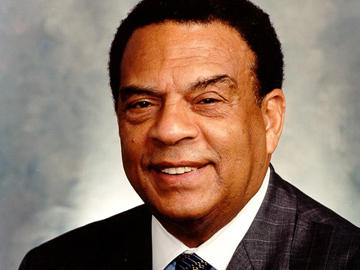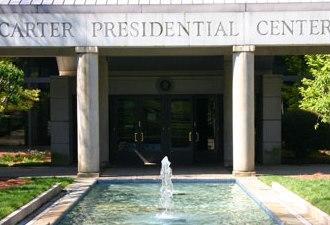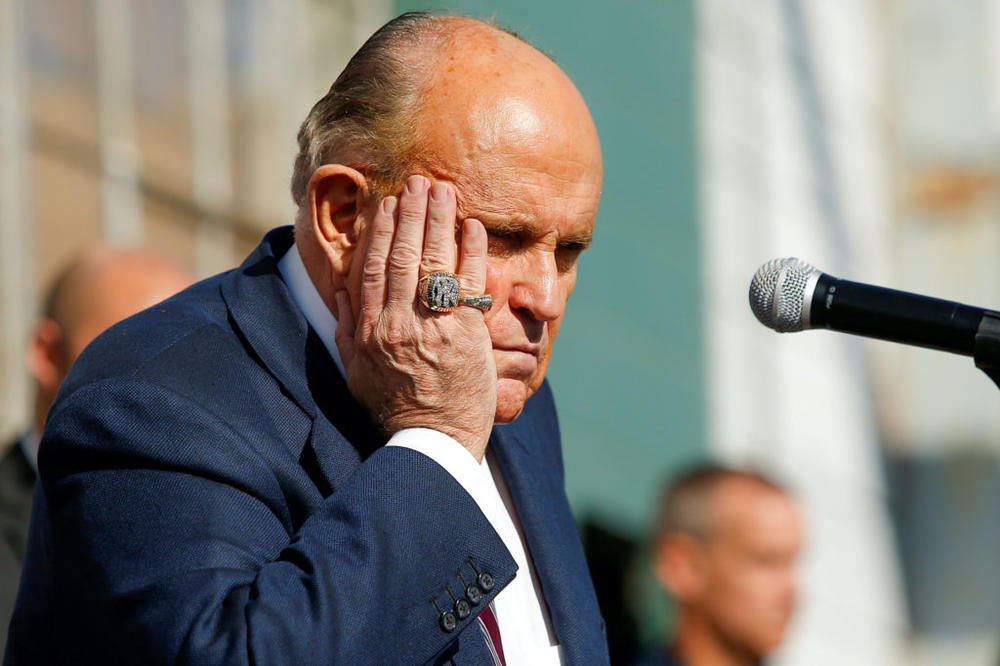
Section Branding
Header Content
Georgia Today: Accused terrorist has GA connections; Macon hotel demolition; Young remembers Carter
Primary Content
LISTEN: On the Thursday, Jan. 2 edition of Georgia Today: The man accused of a terrorist attack in New Orleans has Georgia connections. Hundreds gather to watch the demolition of a longstanding hotel in Macon. And civil rights leader Andrew Young remembers his friend, former President Jimmy Carter.

Peter Biello: Welcome to the Georgia Today podcast from GPB News. Today is Thursday, Jan. 2. I'm Peter Biello. On today's episode, the man accused of a terrorist attack in New Orleans has Georgia connections. Hundreds gathered to watch the demolition of a longstanding hotel in Macon. And civil rights leader Andrew Young remembers his friend, former President Jimmy Carter. These stories and more are coming up on this edition of Georgia Today.
Story 1:
Peter Biello: The U.S. Army veteran who drove a truck into a crowd of New Year's revelers in New Orleans, killing 14 people, had Georgia addresses and attended college in the state. Georgia State University officials say Shamsud-Din Jabbar received a bachelor's degree in computer information systems from GSU in 2017. He told the newspaper in 2015 that he struggled to adjust to life after the military. Multiple news outlets are reporting Jabbar had addresses in metro Atlanta's Cobb and DeKalb counties, but it was unclear when or if he lived at them. The FBI now says the 42-year-old acted alone in the attack in which police killed him.

Story 2:
Peter Biello: Jimmy Carter's life and legacy have been celebrated across the country since his passing on Sunday. But for those who knew him personally, he wasn't just a president or a humanitarian. He was a friend, a man of deep faith, and someone who never forgot where he came from. Former ambassador to the U.N. Andrew Young worked closely with Carter. He's been a trusted adviser and confidante. He sat down with GPB's Pamela Kirkland on Morning Edition to discuss his friend.
Pamela Kirkland: First, what was your reaction to the news of former President Jimmy Carter's passing?
Andrew Young: Well, you know, we knew that President Carter had suffered from both brain cancer and some cancer of the intestine somewhere, but he was determined, we knew, not to leave Rosalynn. And yet, from the time he went to Rosalynn's funeral — and I was there — it seemed as though he'd just been hanging on. And I was wondering why. And then he made a statement that he wanted to live long enough to vote for Kamala Harris. And I thought that was really a good reason to live long enough. And I'm glad I lived long enough to do that. But he's been in hospice for over a year. And I had been down there once, earlier this year, but he was smiling and laughing at us, reminiscing over old times. And I felt that whatever was going on, there was a good thing. But he never had any fear of death. In fact, he talked about it often. And. He had a really sincere Christian view of death and life after death. So I've never worried about his departure. In fact, I feel that way about Martin Luther King also, that his body had left us, but his words and his spirit will always be with us.
Pamela Kirkland: Carter talked a lot about Plains, Ga., being central to who he was. How do you think those roots shaped his perspective? You were just talking about it a little bit, but especially when he was leading on the world stage.
Andrew Young: Well, his mother went to India in the Peace Corps when she was 66 years old. And she had been the county nurse in Sumter County where she delivered all of the babies, Black and white. And she treated them all like they were her family. And she had the same kind of experience in India. And so he was not alone in this. This was — this was an entire family affair. His children shared much of his belief, and they will do — his children and grandchildren — will do a good job in carrying on the mission of the Carter Center.
Pamela Kirkland: He's often called the greatest former president because of his post-presidency work. And we talked a little bit about this the last time we spoke. How do you think that phase of his life redefined what public service could look like?
Andrew Young: Well, I think that public service can and must be a lifetime service. And I don't know why I'm hanging around here, but I keep busy. And anything. I'm invited to do that I feel I'm capable of doing, I don't know how to say no. And I think that's a good way to live and that's the way a lot of people live. They don't consciously have a sense of mission. But I think he did. But I like to disagree a little bit because while he was a great ex-president, I think he brought some integrity and some vision. For instance, if he had remained president for another term, we would all be driving electric cars right now because one of the first things that he did was put up solar panels on the White House. But he also had a poverty program that helped poor people in Philadelphia and Washington, D.C., and up the East Coast where they put windmills on top of the houses to generate electricity as well as solar panels. And they worked it out with the state power companies that they would be paid for the energy that they generated with their fans and with their solar panels. It's something we should have done here in Georgia and probably will have to do because we're going to have to make it easier for all of us to generate more of our own electricity.
Pamela Kirkland: Lastly, I wanted to ask if you had to describe Jimmy Carter in one word, what would it be and why?
Andrew Young: Well, let me take two, a good man. Really, "God's child." I mean, he really was anchored in the Lord. And that made him open to all of God's children, regardless of their nationality, their race, their creed, their national origin or religion. And it made him a citizen of the world. A disciple of Jesus Christ who wandered the world, bestowing forgiveness and love on all of us who need it.
Pamela Kirkland: Andrew Young is the former U.S. ambassador to the U.N. and activist humanitarian. Thank you so much for speaking with me on Morning Edition.
Andrew Young: Thanks a lot. God bless you.

Story 3:
Peter Biello: The Carter Center in Atlanta is preparing for large crowds of people expected to pay their final respects to the late former president. Carter will lie in repose at the center from Saturday night through Tuesday morning. No onsite parking will be available. Metro Atlanta's public transit agency, MARTA, yesterday announced a plan to bus people to the Carter Center from one of its train stations, King Memorial.
Story 4:
Peter Biello: Georgia-based researchers with the U.S. Department of Agriculture are studying ways to better protect poultry against common diseases that can spread quickly and devastate flocks. GPB's Sofi Gratas has more.
Sofi Gratas: While bird flu remains a concern nationally, there are a lot of other viruses that chickens are vulnerable to, like avian bronchitis and herpes. While vaccines offer some protections, these diseases are always evolving. So some scientists are turning to genes and how they're inherited.
John Dunn: That's turning out to be a really exciting area that — has a strong contribution to resistance.
Sofi Gratas: John Dunn runs the Endemic Poultry Viral Diseases Research Unit in Athens. He says farmers already breed with natural resistance in mind, but that geneticists don't really know how it all works — yet.
John Dunn: One of our goals is to try to tie all that together and create birds that are just more resistant in general to all disease and not just one particular disease.
Sofi Gratas: That could help poultry producers save birds and money. For GPB News, I'm Sofi Gratas.
Story 5:
Peter Biello: Kennesaw State University's evening MBA program will be offering a new rural management concentration GPB's Devon Zwald reports.
Devon Zwald: Students will learn the same set of skills all MBA programs have, like finance and strategic marketing, but with an added focus on learning skills that are uniquely needed in rural communities, says Rene Borbeau, the executive director of CSU's MBA programs. She says students will get the chance to learn from state, local and corporate partners.
Rene Borbeau: And so being able to learn from others on how our other rural communities is being led. What opportunities are there? What are the challenges?
Devon Zwald: Borbeau says she hopes students will be able to go on to become leaders in business, government or health care in their own rural communities. KSU is already accepting applications for the first cohort of students that will start in fall 2025. For GPB News, I'm Devon Zwald.

Story 6:
Peter Biello: A University of Georgia researcher has created a potential solution to the problem of PFAS, or forever chemicals, a group of dangerous and resilient chemicals that exist in everyday products. GPB's Chase McGee has more.
Chase McGee: Dr. Jack Huang has studied PFAS at the University of Georgia since 2007, long before most American consumers were aware that their clothes, carpets and cookware could contain carcinogenic materials, which often show up in drinking water. Until recently, the most common ways to remove PFAS from water were through a very few expensive filtration methods. But Dr. Huang's research focused on new methods meant to break down the chemical bonds that make up PFAS, destroying the chemical altogether. Right now, the process is being tested in limited markets, but he's hopeful that it will do some public good.
Dr. Jack Huang: So that's that's my hope, not only in the future. You'll begin seeing these technologies being utilized by wastewater treatment plants.
Chase McGee: Now he's focused on rolling out other technologies to combat efforts like removing contaminants from soil. For GPB News, I'm Chase McGee.
Story 7:
Peter Biello: A clinical trial led by physicians at Emory University and Grady Health System show a twice-yearly injection is 96% effective in reducing the risk of HIV infection. GPB's Ellen Eldridge reports.
Ellen Eldridge: The injectable medication Lenacapavir is given every six months to prevent contracting HIV, the virus that causes AIDS. There are also two highly effective oral medications currently approved for pre-exposure prophylaxis, also known as PrEP. Valeria Cantos is an associate professor at Emory. She says the Lenacapavir clinical trial was as representative as possible to the populations most impacted by HIV.
Valeria Cantos: So diversity is not only in terms of race and ethnicity, but also in terms of gender identity and sexual orientation.
Ellen Eldridge: Cantos says FDA approval is expected for this medication sometime in 2025. Georgia ranks in the top five nationally for people living with HIV. For GPB News, I'm Ellen Eldridge.
Story 8:
Peter Biello: The city of Macon waited until New Year's Day to usher out something old, as GPB's Grant Blankenship explains.
Grant Blankenship: The city bought the old Ramada Hotel for $4.5 million in order to implode it. So a little before 9 a.m., hundreds of people a few blocks away on Coleman Hill counted down together and watched the 16-story building fall.
SOUNDS: Booms from implosion / crowd noise
Grant Blankenship: Kaye Halavaty's memory of the hotel that was dates back to 1978.
Kaye Halavaty: We got married in Warner Robins. We drove all the way to Macon, Ga., — 30 minutes — to spend our honeymoon night. We got there after the bellhops had left. So the security guard took us up to our room and watched him carry me over the threshold.
Grant Blankenship: So is she going to miss the place?
Kaye Halavaty: No. I think our city is moving ahead, and I think part of it is changing out buildings.
Grant Blankenship: The hotel had long been seen as the thing in the way of developing Macon's Ocmulgee riverfront. But no concrete plans have yet been announced for what's to come at the site of the old Ramada. For GPB News, I'm Grant Blankenship in Macon.

Story 9:
Peter Biello: Former New York City Mayor Rudy Giuliani is fighting to hold on to one of his prized possessions as he faces a $148 million defamation verdict: Yankees World Series rings gifted to him by the team's late owner, George Steinbrenner. Giuliani says the ring celebrating four championships during his time as mayor now belong to his son and shouldn't be handed over. In testimony made public Monday. Giuliani described the 1990s rings as a family heirloom and a Yankees good luck charm. The $148 million verdict stems from the defamation case brought by two former Georgia election workers, Ruby Freeman and Shae Moss.
Story 10:
Peter Biello: Delta Air Lines once again tops a list of the most on-time airlines in North America. 83% of the Atlanta-based carrier's departures were on time. That's according to travel data provider Cirium, whose on-time performance rankings were released today. Delta topped the list for a seventh consecutive year, despite a July software outage that stranded thousands of travelers.
Peter Biello: And that's it for our first edition of Georgia Today for 2025. We hope you have made staying on top of Georgia news one of your New Year's resolutions. What better way to do that, of course, than to subscribe to this podcast? When you do, we will pop up in your podcast feed every weekday afternoon with all of the stories fit to broadcast in Georgia. If you've got feedback, we would love to hear from you. Email it to us. That's the best way to reach us. The address is GeorgiaToday@GPB.org And remember, you can always check the latest news at GPB.org/news. I'm Peter Biello. Thanks again for listening. We'll see you tomorrow.
---
For more on these stories and more, go to GPB.org/news



